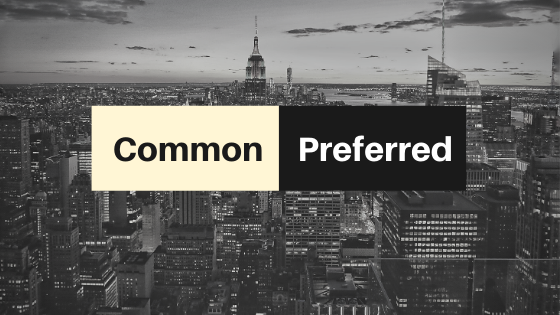Truth about Startup Equity
Many people flock to Silicon Valley for the potential riches of equity in a startup. It’s a common trend; interview for a job, get a half-decent salary and negotiate your stake in the company. After that, you work your tail off for the company to exit (either get acquired or IPO). Everyone knows this, I live and breathe it, but there is something very few people talk about when equity is in the picture: “What kind of stock am I getting?”
You see, there are two kinds of equity… one for the masses and one for the elite: Common Stock and Preferred Stock.
“Common stock is the most basic form of stock, and is mainly issued to founders and employees. Equity compensation for startup employees is usually issued from a pool of Common Stock.” - 500 Startups
“Preferred stock is mainly issued to investors, who pay a higher price per share of ownership. In return, these shareholders have a greater claim to a company’s assets and are paid out first in a liquidity event.” - 500 Startups
When you start negotiating a salary with a startup, equity becomes one of the key assets most employees look for. Generally, the equity that is discussed is Common Stock (unless you specifically ask for preferred which is rarely granted even to “executives” who are not founders). In the ideal situation, common stock will give you a return on your time and effort, but there is another side to this. When a company has gone through its seed, series A, B, etc, preferred stock is given to investors. As 500 Startups stated so clearly, it holds a greater claim to the company’s assets. This means, if your startup was ever bought out, Preferred Stocks get first payouts. Now depending on the buyout, you might or might not get your return on common stock.
Hiedi Roizen best describes the situation in “My company sold for $100 million and I got Zilch. How can that be?”
Background:
Company A has raised $1M in Seed, $10M in Series A and $50M in Series B round. Company A now owes $61M to investors.
Scenario 1:
After a couple of years of development and sales, Company A is now running out of cash. It’s not profitable enough to cover its burn rate for the year and no new investors are coming in for a Series C, it’s time to sell. Let's say they were able to find a buyer, the company gets sold for $70M. That money will be divided first to the preferred stockholder. Investors get back their $61M, the cost of the buyout is $5M in lawyer and accounting fees. Finally, key stakeholders divide up the rest of the $4M with their preferred stocks. All the Common Stockholders now get screwed over.
Scenario 2:
Company A gets acquired for $100M. All the preferred stockholders get their share and the cost of the buyout. The company now has $20M leftover for the Common stockholders to get their share of the money.
These are overly simplified versions of how equity works, but essentially it comes down to how much preferred stock is given out and how much the company was sold for. In most cases, when a company gets acquired, it covers both the preferred and common stocks. During less than ideal situations, common stocks can result in nothing. So when you ask for equity in a company next time, understand that there are no guarantees. Even if your company is bought out, you are last on the priority list to get paid out.

